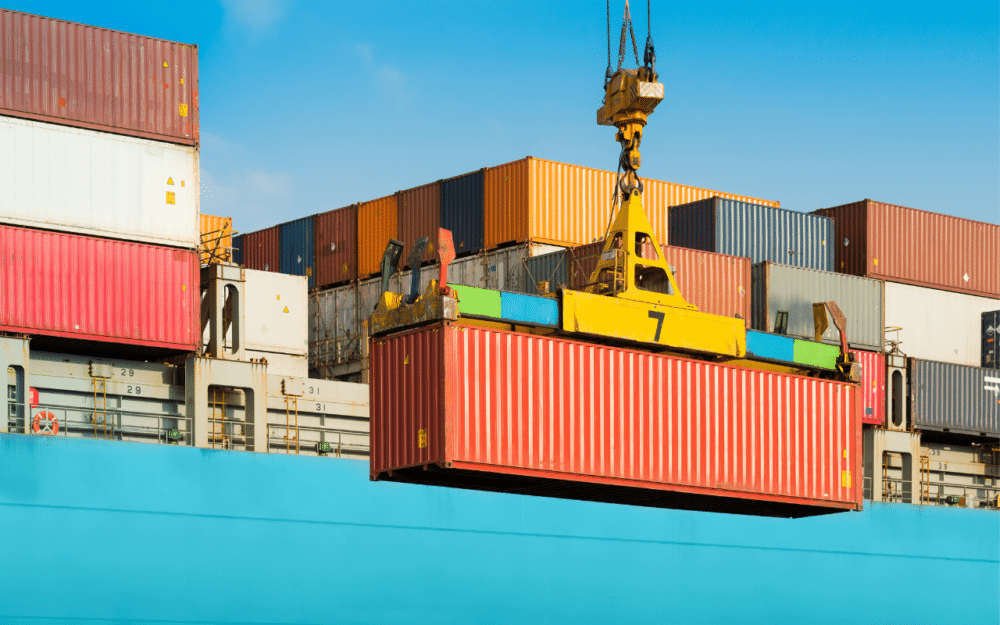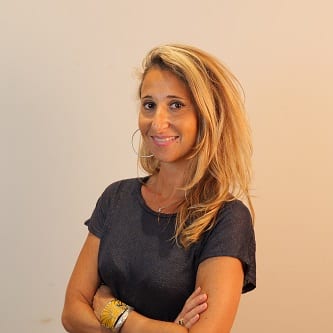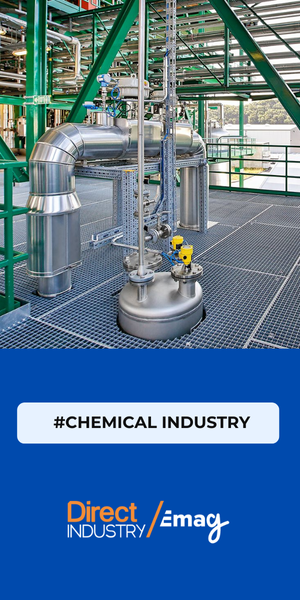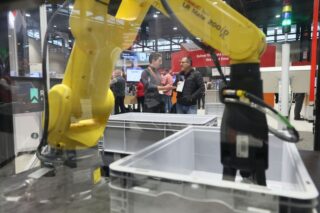How can we accelerate exports, especially for SMEs and mid-sized companies? In France, a government agency, Business France, has been supporting companies in international markets for several years. To further expedite the establishment of French SMEs and start-ups abroad, they created a program called ‘Booster’. We met with the Business France team and three companies that participated in this program.
Exports are a source of growth, revenue, and innovation. It’s also an opportunity for France to energize its exports and reduce its trade deficit. It reached 99.6 billion euros in 2023, the second-highest in history.
It was with this mindset that France established a national bureau several decades ago to support French businesses abroad. It became Business France in 2014.
Exports in Decline
Unfortunately, today, France isn’t exporting enough. For the first time since 2017, the number of exporters fell in 2023. The French Customs Authority counted 143,900 exporting companies last year, 1,800 fewer than in 2022. The sharpest decline was among very small enterprises and small SMEs with fewer than 20 employees.
While SMEs represent 96% of exporters, they account for only 12% of foreign sales. Large companies generated 55% of exports in 2023, despite representing just 0.4% of the total number of exporting companies. The top 100 French exporters (less than 0.1% of the total) accounted for 40% of the 607 billion euros exported in 2023.
However, the French business landscape is rich with SMEs, mid-sized companies, and even start-ups with promising revenue that could succeed internationally but haven’t yet ventured beyond French borders. By contrast, German and Italian companies are two to three times more likely to operate internationally than French companies.
To encourage the development of French SMEs internationally and to bring them closer to the performance of their European neighbors, the government launched the “Dare to Export” (Osez l’Export) plan last August. This initiative, with a budget of 125 million euros, aims to increase the number of French exporting companies to 200,000 by 2030.
Laurent Saint Martin, the President of Business France, emphasizes:
“We need to reach out to more companies that have never gone international and that don’t understand the opportunities available. We’re at a time when expertise and advice for international success have never been more crucial.”
The Booster Program: Accelerating Market Entry
Since 2014, Business France has been supporting innovative French SMEs and start-ups in their export efforts through various acceleration programs, including the Booster program.
The Booster program offers 27 days of tailored guidance and individual coaching in a specific market and a specific sector for around €10,000 per company. Business France promises participants a physical and commercial presence in the target market, with a projected 20% increase in their order book.
Olivier Meglioli, the program director, explains:
“Once selected by a panel of experts, a sectoral booster provides 27 days of support spread over 9 to 12 months, divided into three phases. The preparation phase involves group workshops and individualized mentoring. The projection phase aims to integrate participants into the local ecosystem and accelerate their commercial development. Finally, the stabilization phase offers operational follow-up, the development of a long-term action plan, and anchoring with a local partner recommended by the Team France Export.”
The goal is to teach participants the keys to success in their target market and help them avoid common pitfalls. The program agents are there to arrange meetings and appointments with prospects. However, Business France does not commit to a specific number of meetings they will set up for participants.
In 2023, Business France supported 127 companies through the Booster program, 80% of which were start-ups and SMEs. We met three of these companies to hear about their experiences and understand the benefits they gained from this support program.
Brenus Pharma: Expanding into the North American Market
Brenus Pharma is one of the 2023 alumni of the Booster program. Founded in 2014, this start-up develops therapeutic vaccines against colorectal cancer. Paul Bravetti, CEO of Brenus Pharma, explains:
“We are developing vaccine-based immunotherapies for cancer. We can reproduce the resistance mechanisms we see in patient tumor cells and use that to train the patient’s immune system to recognize these resistance signatures and destroy the tumor cells as soon as they appear.”
The start-up was recently named Biotech of the Year. Brenus Pharma is also closing a Series A funding round. This will enable them to launch their first clinical trial in France, Belgium, and the United States for patients with colorectal cancer.
They chose to work with Business France to help expand into the North American market. They had been collaborating with the agency for a few years, participating in international conferences and networking events. When the Booster program was launched, they were quick to sign up.
“What interested us most was the North American market—both the United States and Canada. In Oncology, it’s one of the biggest markets in the world, alongside Europe, with a large number of patients. It’s also a significant market in terms of revenue.”
The program ran from April 2023 to November 2023. Like all participating companies, the program unfolded in three phases. The first was a thorough analysis of the business case to assess the product’s relevance to the North American market. The second phase involved expert guidance on fundraising, regulations, and clinical trials.
“The final phase, which was crucial for us, provided us with personalized support from the Business France teams. They arranged on-site B2B meetings with key opinion leaders, doctors, and investors. We met with the leading pharmaceutical players in North America. For us, it was crucial to connect with them for future collaborations.”
RELATED ARTICLE
Greentech: Heading to the Middle East
Greentech has also benefited from Business France’s support and its local network in Saudi Arabia.
This biotech company develops active ingredients from marine, plant, and microbial sources, like microalgae, for cosmetics, healthcare, and agronomy industries. It for example offers solutions to improve agricultural yields, as explained by Mohamed Gareche, Middle East Manager:
“We’ve developed natural solutions with bacteria that eliminate harmful bacteria in plants, improving their yield, increasing nutrients, and enhancing water retention. This is especially useful in arid areas with stressed groundwater resources. We tested our solutions on banana plants in the Ivory Coast, and our products significantly increased the root growth of the banana plants.”
With over 230 employees and 30 years of experience, this company already has a significant international presence. They have subsidiaries and distributor networks in the United States, Latin America, Africa, and Europe. Half of their revenue comes from exports. Yet, Greentech joined the Booster program to expand into the Middle East.
While their initial focus was on Dubai, Business France eventually directed them toward Saudi Arabia. France has indeed recently established a strong presence there. Saudi Arabia is undergoing a major transformation. Their Vision 2030 government program is leading to a surge in mega-industrial projects and significant government investment. In this environment, the opportunities for French companies are enormous. And Business France aims to help them capture a significant share of this emerging market.
“The Middle East market interested us greatly because it’s one of the markets highly focused on biotechnology. In these Middle Eastern countries, there’s a strong emphasis on food security. These are countries directly experiencing the effects of climate change and relying heavily on food imports. We were focused on Dubai, but Saudi Arabia was new to us. However, after speaking with the Business France director for Saudi Arabia, it became clear that we could meet the country’s food safety needs.”
They began the program in September 2023. Since last December, Greentech’s teams have been meeting prospects on-site to demonstrate that their products address the country’s needs. Collaborations with Saudi universities are also underway to explore scientific applications.
“What appealed to us about the Booster program is the long-term support—not just occasional missions—with dedicated guidance from the Business France Saudi Arabia team, who know the country well and have established networks. But beyond having connections, they also help us understand how to communicate with Saudis, what they’re attentive to, and alert us to potential cultural biases that Westerners might have about non-Western countries.”
RELATED ARTICLE
Limatech: Discovering Opportunities in Saudi Arabia
Limatech, an industrial deep-tech start-up, has also benefited from Business France’s cultural guidance. Founded in October 2016, Limatech specializes in manufacturing lithium-based starter batteries for decarbonizing aviation. While lead-acid or nickel-cadmium batteries used in traditional aviation are toxic, Limatech’s batteries use safer chemistries, like lithium iron phosphate.
The company also took part in the Booster program in Saudi Arabia. Like Brenus Pharma, Limatech had already been collaborating with Business France, having met with Boeing in 2022 through the agency’s efforts. And like Greentech, Saudi Arabia wasn’t their first choice, as co-founder Florence Robin admits:
“Initially, I wasn’t enthusiastic about going there. Business France insisted, telling me that the country was in the midst of an industrial boom and that the Saudi ecosystem was eager to meet with French companies in energy and aviation. I agreed to go. And it was a real shock, in the best possible way.”
The Middle East is indeed booming, particularly in aviation, with large MRO (Maintenance, Repair, and Operations) facilities and airports being built, and aircraft sales growing.
“This means there will be large fleets to retrofit with lithium batteries. And our batteries have many advantages: they require half the maintenance and have a longer lifespan (about 10 years). Lithium is also lighter, reducing the weight of aircraft—120 kg for an A320 and 25 kg for a helicopter.”
Thus, there is a significant market in Saudi Arabia for Limatech. Over four months, Florence regularly spoke with various stakeholders in the Saudi ecosystem, including industry players, airlines, and members of the Saudi government, before visiting in person.
During her visit, she also discovered new markets outside of aviation. Limatech’s lithium batteries, which meet 49 high-level tests, can also be used in harsh environments. Their accumulators can indeed withstand temperatures from -40°C to +60°C.
“In Saudi Arabia, we met with Ma’aden, a mining company. They extract aluminum, and phosphate, and use nickel-cadmium batteries like the aviation industry—for their machinery and backup batteries. Given the extreme temperatures and sand in the region, it’s the most suitable technology today. But the mining industry could definitely be a new market for our lithium batteries.”
Moreover, Saudi Arabia is turning to renewable energy. Wind turbines and solar panels need large-scale batteries. This could also be an additional and significant opportunity for the company.
RELATED ARTICLE
Results
What is the return on investment of the Booster program? What are the outcomes for the companies involved? And could they have penetrated these markets without Business France’s assistance?
For Paul Bravetti of Brenus Pharma, the connections made through the program significantly accelerated his company’s expansion into the United States. They are now partnering with two major American academic centers, MD Anderson and Johns Hopkins, both global benchmarks. Johns Hopkins will even be part of their clinical trial, he told us.
For Mohamed Gareche of Greentech, the program was so successful that the company is now opening a branch in Riyadh, where they’ll produce Greentech’s various bacteria and microalgae on-site.
For Florence Robin of Limatech, the results were also positive. She has started discussions that might lead to commercial contracts with local companies in aviation. She also discovered a new market like the mining sector with great potential.
Could these three companies have gone international without help? According to Paul Bravetti of Brenus Pharma:
“We might have needed more time to achieve the same results because we probably wouldn’t have had the opportunity to stay on-site for extended periods. You can try to work the American market from afar, but in the U.S., you have to meet in person, things move quickly, and relationships need constant attention. If you’re not there, it doesn’t work. So it was necessary to be supported to enter this market.”
Even Greentech, a seasoned exporter, found the program valuable, Mohamed acknowledges:
“Every destination is different, and you can’t just copy an experience from Country A to Country B. It’s crucial to be supported by a local entity. We chose Business France because we considered it the most relevant option. We could have done it ourselves, but it would have taken three years. In the etymological sense of the word ‘Booster,’ the program allowed us to boost our export efforts. “
For Florence Robin of Limatech:
“The aviation industry is a small world, and with more time, we could have eventually entered it. But what this program opened for us was new potential markets and partnerships.”
However, even though these three companies are satisfied with the program’s results, Mohamed Gareche from Greentech points out that the Booster program doesn’t do everything.
“It showed us that it works well in Saudi Arabia. But you have to remember that Business France is just a springboard; they’re not the ones securing contracts for us. That’s up to us. They help us meet the right people and save time, but it’s our responsibility to sell. Because we are the ones who understand our solutions and our interlocutors’ issues better.”
According to Business France, a standard export approach without support leads to a failure rate of 25%. With the program, they say, this rate drops to 6%.
Business France’s Booster program will continue in 2024. A total of 120 companies have already signed up to participate.






![Image [BUYING GUIDE] How to Choose the Right Industrial Robot?](/wp-content/uploads/sites/3/Industrial-Robot-320x213.jpg)

![Image [Buying Guide] How to Choose the Right Safety Shoes?](/wp-content/uploads/sites/3/Safety-Shoes-320x213.jpg)


![Image [Buying Guide] How to Choose the Right AMR?](/wp-content/uploads/sites/3/AMR-320x213.jpg)